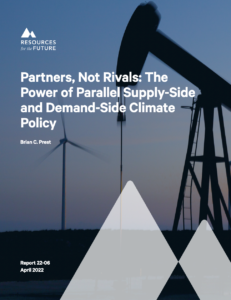Full Title: Partners, Not Rivals: The Power of Parallel Supply-Side and Demand-Side Climate Policy
Author(s): Brian Prest
Publisher(s): Resources for the Future
Publication Date: April 21, 2022
Full Text: Download Resource
Description (excerpt):
This report examines how supply- and demand-side policies, when pursued in tandem, can help mitigate emissions leakage.
Despite recent progress in securing international commitments to fight climate change, such as the Paris Agreement, current climate policies remain far from sufficient to limit global temperature rise to 1.5°C. While this indicates more aggressive steps are needed, many policy levers remain underutilized. By and large, the policies pursued thus far have focused on demand-side measures, such as fuel economy standards, that directly reduce the consumption of fossil fuels, whereas supply-side measures that directly reduce fossil fuel extraction have received relatively little attention. This lopsided focus is at odds with the International Energy Agency’s 1.5°C-consistent pathway, which entails “no investment in new fossil fuel supply projects” starting immediately. Similarly, Welsby et al. (2021) calculate that the same target would require leaving 60 percent of existing oil and gas reserves and 90 percent of coal reserves in the ground. Such reserves would seem to be a natural focus of climate policy. In the United States, greenhouse gas emissions associated with federally owned fossil fuels are equivalent to about 24 percent of annual US emissions (Merrill et al. 2018; Ratledge et al. 2022), giving the federal government direct control over the extraction of these resources. Abroad, even larger shares of fossil fuel reserves are directly owned by governments. Yet governments have largely eschewed policies that directly reduce fossil fuel extraction.
